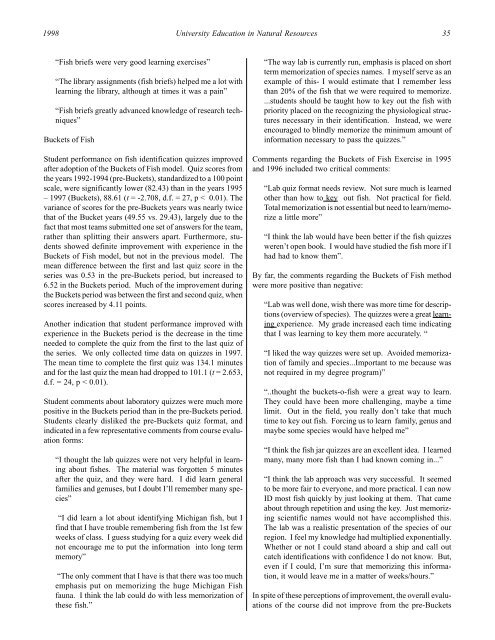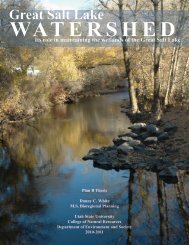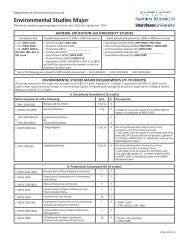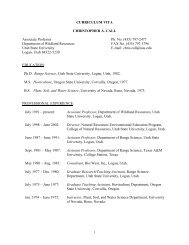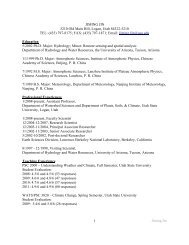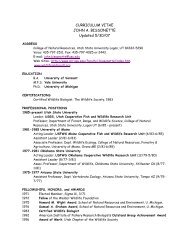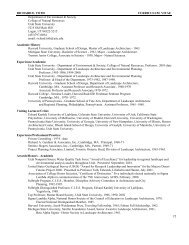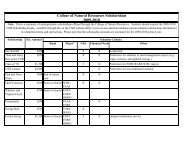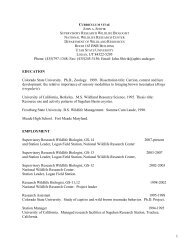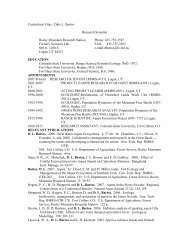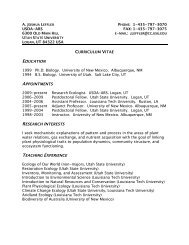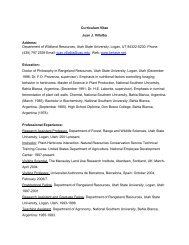University Education in Natural Resources - CNR Home - Utah State ...
University Education in Natural Resources - CNR Home - Utah State ...
University Education in Natural Resources - CNR Home - Utah State ...
You also want an ePaper? Increase the reach of your titles
YUMPU automatically turns print PDFs into web optimized ePapers that Google loves.
1998<br />
<strong>University</strong> <strong>Education</strong> <strong>in</strong> <strong>Natural</strong> <strong>Resources</strong> 35<br />
“Fish briefs were very good learn<strong>in</strong>g exercises”<br />
“The library assignments (fish briefs) helped me a lot with<br />
learn<strong>in</strong>g the library, although at times it was a pa<strong>in</strong>”<br />
“Fish briefs greatly advanced knowledge of research techniques”<br />
Buckets of Fish<br />
Student performance on fish identification quizzes improved<br />
after adoption of the Buckets of Fish model. Quiz scores from<br />
the years 1992-1994 (pre-Buckets), standardized to a 100 po<strong>in</strong>t<br />
scale, were significantly lower (82.43) than <strong>in</strong> the years 1995<br />
– 1997 (Buckets), 88.61 (t = -2.708, d.f. = 27, p < 0.01). The<br />
variance of scores for the pre-Buckets years was nearly twice<br />
that of the Bucket years (49.55 vs. 29.43), largely due to the<br />
fact that most teams submitted one set of answers for the team,<br />
rather than splitt<strong>in</strong>g their answers apart. Furthermore, students<br />
showed def<strong>in</strong>ite improvement with experience <strong>in</strong> the<br />
Buckets of Fish model, but not <strong>in</strong> the previous model. The<br />
mean difference between the first and last quiz score <strong>in</strong> the<br />
series was 0.53 <strong>in</strong> the pre-Buckets period, but <strong>in</strong>creased to<br />
6.52 <strong>in</strong> the Buckets period. Much of the improvement dur<strong>in</strong>g<br />
the Buckets period was between the first and second quiz, when<br />
scores <strong>in</strong>creased by 4.11 po<strong>in</strong>ts.<br />
Another <strong>in</strong>dication that student performance improved with<br />
experience <strong>in</strong> the Buckets period is the decrease <strong>in</strong> the time<br />
needed to complete the quiz from the first to the last quiz of<br />
the series. We only collected time data on quizzes <strong>in</strong> 1997.<br />
The mean time to complete the first quiz was 134.1 m<strong>in</strong>utes<br />
and for the last quiz the mean had dropped to 101.1 (t = 2.653,<br />
d.f. = 24, p < 0.01).<br />
Student comments about laboratory quizzes were much more<br />
positive <strong>in</strong> the Buckets period than <strong>in</strong> the pre-Buckets period.<br />
Students clearly disliked the pre-Buckets quiz format, and<br />
<strong>in</strong>dicated <strong>in</strong> a few representative comments from course evaluation<br />
forms:<br />
“I thought the lab quizzes were not very helpful <strong>in</strong> learn<strong>in</strong>g<br />
about fishes. The material was forgotten 5 m<strong>in</strong>utes<br />
after the quiz, and they were hard. I did learn general<br />
families and genuses, but I doubt I’ll remember many species”<br />
“I did learn a lot about identify<strong>in</strong>g Michigan fish, but I<br />
f<strong>in</strong>d that I have trouble remember<strong>in</strong>g fish from the 1st few<br />
weeks of class. I guess study<strong>in</strong>g for a quiz every week did<br />
not encourage me to put the <strong>in</strong>formation <strong>in</strong>to long term<br />
memory”<br />
“The only comment that I have is that there was too much<br />
emphasis put on memoriz<strong>in</strong>g the huge Michigan Fish<br />
fauna. I th<strong>in</strong>k the lab could do with less memorization of<br />
these fish.”<br />
“The way lab is currently run, emphasis is placed on short<br />
term memorization of species names. I myself serve as an<br />
example of this- I would estimate that I remember less<br />
than 20% of the fish that we were required to memorize.<br />
...students should be taught how to key out the fish with<br />
priority placed on the recogniz<strong>in</strong>g the physiological structures<br />
necessary <strong>in</strong> their identification. Instead, we were<br />
encouraged to bl<strong>in</strong>dly memorize the m<strong>in</strong>imum amount of<br />
<strong>in</strong>formation necessary to pass the quizzes.”<br />
Comments regard<strong>in</strong>g the Buckets of Fish Exercise <strong>in</strong> 1995<br />
and 1996 <strong>in</strong>cluded two critical comments:<br />
“Lab quiz format needs review. Not sure much is learned<br />
other than how to key out fish. Not practical for field.<br />
Total memorization is not essential but need to learn/memorize<br />
a little more”<br />
“I th<strong>in</strong>k the lab would have been better if the fish quizzes<br />
weren’t open book. I would have studied the fish more if I<br />
had had to know them”.<br />
By far, the comments regard<strong>in</strong>g the Buckets of Fish method<br />
were more positive than negative:<br />
“Lab was well done, wish there was more time for descriptions<br />
(overview of species). The quizzes were a great learn<strong>in</strong>g<br />
experience. My grade <strong>in</strong>creased each time <strong>in</strong>dicat<strong>in</strong>g<br />
that I was learn<strong>in</strong>g to key them more accurately. “<br />
“I liked the way quizzes were set up. Avoided memorization<br />
of family and species...Important to me because was<br />
not required <strong>in</strong> my degree program)”<br />
“..thought the buckets-o-fish were a great way to learn.<br />
They could have been more challeng<strong>in</strong>g, maybe a time<br />
limit. Out <strong>in</strong> the field, you really don’t take that much<br />
time to key out fish. Forc<strong>in</strong>g us to learn family, genus and<br />
maybe some species would have helped me”<br />
“I th<strong>in</strong>k the fish jar quizzes are an excellent idea. I learned<br />
many, many more fish than I had known com<strong>in</strong>g <strong>in</strong>...”<br />
“I th<strong>in</strong>k the lab approach was very successful. It seemed<br />
to be more fair to everyone, and more practical. I can now<br />
ID most fish quickly by just look<strong>in</strong>g at them. That came<br />
about through repetition and us<strong>in</strong>g the key. Just memoriz<strong>in</strong>g<br />
scientific names would not have accomplished this.<br />
The lab was a realistic presentation of the species of our<br />
region. I feel my knowledge had multiplied exponentially.<br />
Whether or not I could stand aboard a ship and call out<br />
catch identifications with confidence I do not know. But,<br />
even if I could, I’m sure that memoriz<strong>in</strong>g this <strong>in</strong>formation,<br />
it would leave me <strong>in</strong> a matter of weeks/hours.”<br />
In spite of these perceptions of improvement, the overall evaluations<br />
of the course did not improve from the pre-Buckets


